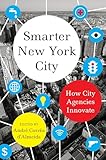Smarter New York City : How City Agencies Innovate / ed. by André Corrêa d'Almeida.
Material type: TextPublisher: New York, NY : Columbia University Press, [2018]Copyright date: ©2018Description: 1 online resource : 62 b&w photos27 b&w illustrationsContent type:
TextPublisher: New York, NY : Columbia University Press, [2018]Copyright date: ©2018Description: 1 online resource : 62 b&w photos27 b&w illustrationsContent type: - 9780231183741
- 9780231545112
- 352.3/67216097471 23
- JS1234.A1
- JS1234.A1 S73 2018
- online - DeGruyter
- Issued also in print.
| Item type | Current library | Call number | URL | Status | Notes | Barcode | |
|---|---|---|---|---|---|---|---|
 eBook
eBook
|
Biblioteca "Angelicum" Pont. Univ. S.Tommaso d'Aquino Nuvola online | online - DeGruyter (Browse shelf(Opens below)) | Online access | Not for loan (Accesso limitato) | Accesso per gli utenti autorizzati / Access for authorized users | (dgr)9780231545112 |
Frontmatter -- CONTENTS -- Foreword -- Preface -- Acknowledgments -- Introduction -- PART I. DATA, ORGANIZATION, AND TECHNOLOGY -- 1. OneNYC and the SDGs: A City Strategy with Global Relevance -- 2. The Mayor's Office of Data Analytics: Institutionalizing Analytical Excellence -- 3. LinkNYC: Redesigning Telecommunication to Activate the Twenty-First-Century Creative City -- PART II. CIT Y SERVICES AND DOMAINS OF LIFE -- 4. The New York City Business Atlas: Leveling the Playing Field for Small Businesses with Open Data -- 5. Demand Response: Incentives for Smarter Energy Management -- 6. Green Infrastructure Plan: Opportunities for Innovation in Climate-Change Resilience -- 7. Residential Curbside Organic-Waste Collection Program: Innovation for Sustainability -- 8. Syndromic Surveillance System: The Science and Art of Using Big Data to Monitor the Health of New York City -- 9. Solving City Challenges Through Neighborhood Innovation Labs: Moving from Smart Cities to Informed Communities -- PART III. SAFETY AND MOBILITY -- 10. NYPD ShotSpotter: The Policy Shift to "Precision-Based" Policing -- 11. Vision Zero NYC: Toward Ending Fatalities on the Road -- 12. Midtown in Motion: Real-Time Solutions to Traffic Congestion -- PART IV. BECOMING A SMARTER CITY -- Conclusion: Becoming a Smarter City -- Epilogue: Future Possibilities: Now, Next, and Next After Next -- Contributors -- Index
restricted access online access with authorization star
http://purl.org/coar/access_right/c_16ec
Innovation is often presented as being in the exclusive domain of the private sector. Yet despite widespread perceptions of public-sector inefficiency, government agencies have much to teach us about how technological and social advances occur. Improving governance at the municipal level is critical to the future of the twenty-first-century city, from environmental sustainability to education, economic development, public health, and beyond. In this age of acceleration and massive migration of people into cities around the world, this book explains how innovation from within city agencies and administrations makes urban systems smarter and shapes life in New York City.Using a series of case studies, Smarter New York City describes the drivers and constraints behind urban innovation, including leadership and organization; networks and interagency collaboration; institutional context; technology and real-time data collection; responsiveness and decision making; and results and impact. Cases include residential organic-waste collection, an NYPD program that identifies the sound of gunshots in real time, and the Vision Zero attempt to end traffic casualties, among others. Challenging the usefulness of a tech-centric view of urban innovation, Smarter New York City brings together a multidisciplinary and integrated perspective to imagine new possibilities from within city agencies, with practical lessons for city officials, urban planners, policy makers, civil society, and potential private-sector partners.
Issued also in print.
Mode of access: Internet via World Wide Web.
In English.
Description based on online resource; title from PDF title page (publisher's Web site, viewed 29. Mrz 2022)


